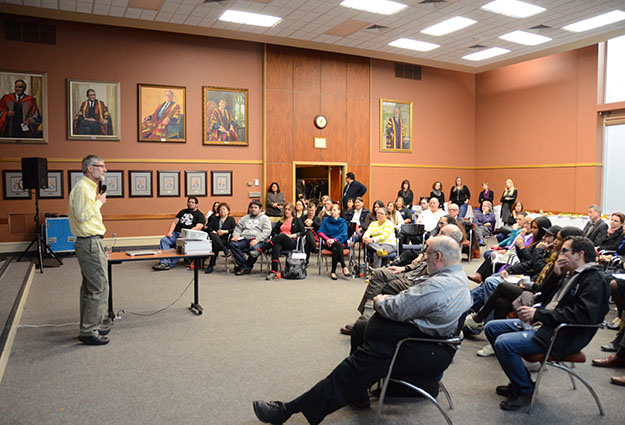Indigenous Studies celebrates 20 years at McMaster

McMaster professor William Coleman reflects on the roots of the University's Indigenous Studies Program during last Friday's open house. The event marked 20 years of ISP, and paid tribute to Paul. R. MacPherson Chair holder Dawn Martin-Hill and the winners of this year's Harvey Longboat Graduate Scholarship Award.
William Coleman remembers his introduction to Dawn Martin-Hill like it was yesterday.
During the mid-1980s, Coleman was teaching a second-year history course at McMaster with a focus on Canadian politics and federalism. Several weeks into class, a female student approached the young professor with a simple question: “When will we get to the Aboriginal content?”
In many ways, that exchange set in motion a series of events that led to the creation of McMaster’s Indigenous Studies Program.
On Friday, members of the McMaster and Hamilton communities gathered in Council Chambers to celebrate the landmark 20th anniversary of the program. The event featured a number of key players in the development of ISP during the late-1980s and early-1990s, including former University President Alvin Lee, former Provost Arthur Heidebrecht, professor emeritus Harvey Feit, current program director Rick Monture, and of course, Coleman and Martin-Hill.
As part of the proceedings, Martin-Hill was officially named the inaugural holder of the Paul. R. MacPherson Chair in Indigenous Studies.
“It takes a village to do something like the Indigenous Studies Program,” said Martin-Hill, a three-time graduate of McMaster’s Faculty of Social Sciences and longtime associate professor. “You can see what kind of luck I had as a student, to have so many great supporters. They were all so committed.”
In her new appointment, Martin-Hill will help further McMaster’s Indigenous Studies research efforts, with particular emphasis on preserving Hodinohsó:ni knowledge, languages, culture and history.
Friday’s open house also recognized the three winners of this year’s Harvey Longboat Graduate Scholarship Award: Kaitlin Debicki, Sandra Muse Isaacs and Ronda Stringer. All three women are PhD candidates at McMaster.
Valued at up to $15,000, the scholarship is awarded annually to a First Nation, Inuit, or Métis graduate student who has demonstrated high academic achievement and outstanding community leadership skills. This year marks the first time the award has been presented to three recipients.
“I chose McMaster because of the Indigenous Studies Program,” said Debicki, a PhD candidate in the Department of English and Cultural Studies. “The University has provided me with a way to connect with who I am and where I come from.”
Muse Isaacs, now a three-time winner of the scholarship, has most recently been conducting research on the North Carolina reservation of the Eastern Band of Cherokee Indians. Stringer is a researcher in the University’s MD/PhD Program.
Since its inception in 1993, the ISP has focused on three main objectives: to recruit and assist Indigenous students in obtaining a University degree; to increase awareness of Indigenous culture and issues; and to work in collaboration with Aboriginal community partners on a variety of academic projects and events. Today, the program offers more than 25 unique courses involving Aboriginal history, language, politics, health and culture. Regardless of the topic, each class emphasizes the value of community engagement in education.
Many attendees of Friday’s event reflected on the remarkable growth of the program over the past two decades, and the lasting value of launching a formal ISP curriculum at the University.
“I remember a tremendous sense of purpose surrounding the program,” said Heidebrecht, one of several guest speakers at the open house. “Those are some of the times I remember most fondly, in terms of making a real difference at McMaster.”
Now in its 24th year of existence, the McMaster First Nations Students Association (MFNSA) continues to function as an extension of the academic program, while providing support and encouragement for Aboriginal students at all levels.
Earlier this year, the ISP officially became part of the Faculty of Social Sciences. Once completed in 2015, McMaster’s state-of-the-art L.R. Wilson Hall will become the new home for the ISP, along with many other liberal arts programs at McMaster.


